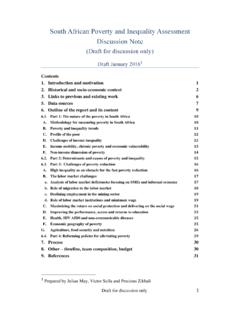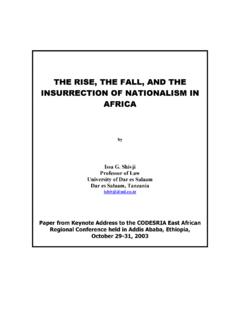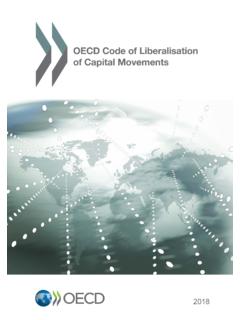Transcription of DEMOCRACY AND SOCIAL MOVEMENTS IN SOUTH AFRICA
1 DEMOCRACY AND SOCIAL MOVEMENTS IN SOUTH AFRICA By Dr. Dale T. McKinley* (Paper for UKZN School of Development Studies Conference: Reviewing the First Decade of Development and DEMOCRACY in SOUTH AFRICA : 22-24th October 2004, Durban) The liberation struggle revisited .. it is of less importance to us whether capitalism is smashed or not. It is of greater importance to us that while capitalism exists, we must fight and struggle to get our full share and benefit from the Dr. Xuma, President-General of the ANC (1945) For the better part of three decades (from the early 1960s to the early 1990s), the dominant theoretical basis for the ANC s liberation struggle had been cast within the necessity for the revolutionary seizure of power. Whether applied to the smashing of apartheid and the attainment of majority rule or as a springboard to a transition to socialism, the revolutionary seizure of power was presented as a necessary pre-condition for movement forward. Joe Slovo had put it this way: Thus there is a distinction between the creation of the new state form and the building of a new socialist economic formation.
2 The former is made possible by a revolutionary seizure of power; the latter, through the exercise of that political power by a class whose interests are unconditionally served by a socialist Many liberal and neo-Marxist academics, as well as numerous Alliance intellectuals, have historically conceptualised arguments for a revolutionary seizure of power in narrowly statist terms. As a result, the (autonomous) state is given the status of the struggle 'throne', leaving revolutionary (purposive) struggle cast in terms of a fight for a specific form (structure) of power rather than its foundation/content. If such an approach is adopted, either theoretically or practically, there emerges a false dichotomy between the political and the socio-economic 'sides' of revolutionary struggle. Thus political control of the state can be achieved with no corresponding transformation of the economic sphere; and we only have to take one quick glance at the contemporary results of most third world political revolutions to see what kind of national liberation has been delivered.
3 In the historical context of the SOUTH African struggle then, such approaches have provided the basis from which to lend both revolutionary credence to purely political change and ammunition for critics of any revolutionary struggle that is outside the theoretical (read: 1 As quoted in, Robert Fine and Dennis Davis (1990), Beyond Apartheid: Labour and Liberation in SOUTH AFRICA (Johannesburg: Ravan Press), 2 Joe Slovo (1976), SOUTH AFRICA No Middle Road , in Basil Davidson, David Wilkinson and Joe Slovo (eds), Southern AFRICA : The New Politics of Revolution (Harmondsworth: Penguin Books), 2strategic) and practical (read: institutional) boundaries demanded by liberal bourgeois (capitalist) DEMOCRACY . However, there is nothing implicitly statist in any struggle for revolutionary change. What is implicit though, is that there must be a fundamental attack on the entrenched economic and political interests of capital (in whatever form) in order for there to be meaningful liberation.
4 As the ANC had put this quite clearly in the 1970s: It is therefore a fundamental feature of our strategy that victory must embrace more than formal political DEMOCRACY . To allow the existing economic forces to retain their interests intact is to feed the root of racial supremacy and does not represent even a shadow of And yet the cumulative effect of the strategic and tactical programme of the ANC s liberation struggle, consummated in the period of a negotiated transition in the early 1990s, was to demobilise gradually the only constituency capable of leading and carrying through such a revolutionary struggle , the broad working class made up of organised workers and the unemployed. The strategic primacy given to the achievement of a narrowly conceived national and liberal bourgeois DEMOCRACY allowed for a fundamental contradiction to permeate SOUTH AFRICA s transition to DEMOCRACY : namely, that the ANC's own base constituency (the broad working class) have had to take a transitional back seat to a whole host of powerful SOCIAL and economic forces, both national and international, whose fundamental interests are inimical to revolutionary political and socio-economic transformation.
5 The strategic statism of the ANC's struggle for national liberation consistently underestimated and seriously undermined the potential and actual struggles of the ANC s own working class constituency. More specifically, the political strategies of the liberation movement lead to a lack of recognition and incorporation of actual struggles on the ground that were themselves, grounded in a struggle for political and socio-economic liberation from apartheid-capitalism. The false separation, both theoretically and practically, between political and socio-economic change that emerged out of the negotiated settlement, meant that processes such as democratisation took on a narrow bourgeois, nationalist and predominantly political meaning and context in which changes in socio-economic power relations were subordinated to changes in who controlled the seat of political power (that is, a privileging of the economic status quo capitalism - and the institutions of bourgeois DEMOCRACY essential to its maintenance).
6 The foundations of the post-1994 democratic divide The device by which content is replaced by form and ideas by phrases has produced a host of declamatory last offshoots had of course to lead to DEMOCRACY . Karl Marx4 3 Ibid, 4 Karl Marx and Frederick Engels (1977), Collected Works, , (Moscow: Progress Publishers), 3 When SOUTH AFRICA s first ever one-person, one-vote elections in 1994 resulted in an overwhelming victory for the ANC, the majority of SOUTH Africans understandably celebrated the arrival of a new DEMOCRACY . After all, the ANC and its liberation movement allies were now in political control of the state thanks to the votes of those who had, throughout SOUTH AFRICA s modern history, been denied the right of institutionalised democratic participation. Accompanying this however, there still remained a broad based (but ultimately mistaken) expectation amongst the black majority that the new ANC state would immediately begin to pursue a more socialist - or at the least, radically redistributive - political economy.
7 Besides the contextual backdrop of militant, mass-based political and socio-economic struggles that had been waged since the mid-1980s alongside the continued radical rhetoric of the ANC itself, such an expectation was fuelled by the ANC s adoption of the Reconstruction and Development Programme (RDP) as its main policy platform on which it had based its electoral campaign. With it s rhetorical centrepiece being the creation of a people centred society , the RDP proposed to pursue growth and development through reconstruction and redistribution, sought a leading and enabling role for government in guiding a mixed economy, prioritised the meeting of basic socio-economic needs for the poor majority and argued for a living wage as a prerequisite for achieving the required level of economic The millions of organised workers and unemployed who had provided the ANC with both its political and organisational power, looked to the RDP s promises to create millions of jobs, provide massive increases in infrastructure, meet basic SOCIAL needs and redistribute large amounts of white-owned land.
8 It did not take long however, for the new ANC state to make it known that the basis upon which the objectives outlined in the RDP were to be approached would be through a tightly controlled macro-economic balance. Thus, at the same time that the RDP was being seen by ANC supporters and most black SOUTH Africans as the framework for a more radical and substantive shift in the country s political economy, the ANC government was stressing the need for fiscal discipline, export-oriented growth, privatisation and decreased levels of corporate taxation6. Importantly then, the first two years of SOUTH AFRICA s new DEMOCRACY witnessed the ANC s gradual, even if at times contested, political and ideological acceptance of the broad framework of a globally dominant, neo-liberal political and economic In these early transitional years, the ANC cleverly sought to utilise the all-encompassing, legitimating argument of liberal bourgeois DEMOCRACY ; namely, that its link to society is held to be that it operates at the level of the general interest.
9 8 When coupled to the more practical global offensive of internationalised corporate and finance capital (otherwise known as neo liberalism), it then appears as though liberal bourgeois DEMOCRACY has taken on the mantle of a necessary and natural political product of an equally necessary and 5 For a detailed exposition of the fundamentals of the RDP see, National Institute for Economic Policy (1986), From the RDP to GEAR , Research Paper Series, Johannesburg, NIEP. 6 See Adam Habib & Vishnu Padayachee (2000), Economic Policy and Power Relations in SOUTH AFRICA s Transition to DEMOCRACY , University of Natal Durban School of Development Studies Research Paper. 7 This was ameliorated, to some extent, by a period of intense legislative activity designed to repeal apartheid-era discrimination and facilitate new SOCIAL and economic opportunities for historically disadvantaged sectors of the population. 8 Michael Levin (1989), Marx, Engels and Liberal DEMOCRACY (New York: St.)
10 Martin s Press), 4natural economic order. Under such a scenario, DEMOCRACY itself becomes synonymous with the capitalist free market and everything else is merely about degrees and emphases. Crucially, the rightward ideological shift of the ANC was paralleled by the systematic dismemberment, or incorporation into the organisational framework of the ANC itself, of most all, independent and allied community organisations (whether civics , women s organisations and/or youth groupings etc.) in SOUTH AFRICA . By the mid-1990s the vast majority of those community organisations that had been so central to the radicalisation of the anti-apartheid struggle and that had sustained the hope of millions for an anti-capitalist transformation of SOUTH African society, had been swallowed by the ANC and, to a lesser extent by its Alliance partners. As a result, the political and organisational terrain for active and militant resistance to the ANC s creeping neo-liberalism, elite deal making and wholesale acceptance of the institutionalised framework of bourgeois DEMOCRACY was effectively contained within the ANC and its Alliance partners.








